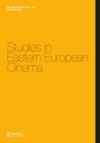From Prague to Łódź and back again: the Czech scriptwriter Pavel Hajný and Czechoslovak–Polish cultural transfer in the 1970s and 1980s
IF 0.4
0 FILM, RADIO, TELEVISION
引用次数: 0
Abstract
Abstract From the mid-1970s to the end of the state-socialist regimes in Central Europe in 1989, the Czech scriptwriter and dramaturg Pavel Hajný successfully fostered parallel careers in two national film industries: between 1975 and 1989, Hajný was personally involved in, or indirectly participated on 11 strictly Polish projects or Czechoslovak–Polish co-productions. The theoretical and terminological framework of the analysis is borrowed from William H. Sewell Jr.’s concept of agency as an effective control over cultural schemas. The article examines the way Hajný used his resources when facing the schemas established in the Polish production culture. The authors claim that the effectiveness of Pavel Hajný as an agent travelling successfully between the Czech and the Polish film industries resulted from two essential factors: the compatibility of his knowledge as a scriptwriter and dramaturg with the demands of the Polish units, and the flexible adaptation of his skills to the schemas he was confronted with in the Polish production culture. It was his attitude, which focused on the fluent transfer of compatible norms rather than on changing the schemas, that helped him to establish a position as a sought-after craftsman. His career, not being a model of transnational fluidity, is exemplary of a strategy intentionally designed for crossing between two production cultures that were structurally compatible, but that evinced discrepancies in ideological, aesthetical, and professional norms.从布拉格到Łódź再回来:捷克编剧帕维尔Hajný与七八十年代的捷克斯洛伐克-波兰文化转移
从20世纪70年代中期到1989年中欧国家社会主义政权结束,捷克编剧和剧作家帕维尔Hajný成功地在两个国家的电影工业中培养了平行的职业生涯:1975年至1989年,Hajný亲自参与或间接参与了11个严格意义上的波兰项目或捷克斯洛伐克-波兰联合制作。该分析的理论和术语框架借鉴了小威廉·h·休厄尔的代理概念,即代理是对文化图式的有效控制。本文考察了Hajný在面对波兰生产文化中建立的模式时使用其资源的方式。作者声称,Pavel Hajný作为代理人在捷克和波兰电影工业之间成功旅行的有效性源于两个基本因素:他作为编剧和戏剧的知识与波兰单位的要求相兼容,以及他的技能灵活适应他在波兰制作文化中所面临的模式。正是他的态度,专注于兼容规范的流畅转移,而不是改变模式,帮助他建立了一个受欢迎的工匠的地位。他的职业生涯并不是跨国流动的典范,而是一种战略的典范,这种战略旨在跨越两种生产文化,这两种文化在结构上是相容的,但在意识形态、美学和专业规范上却存在差异。
本文章由计算机程序翻译,如有差异,请以英文原文为准。
求助全文
约1分钟内获得全文
求助全文
来源期刊

Studies in Eastern European Cinema
Arts and Humanities-Visual Arts and Performing Arts
CiteScore
0.50
自引率
0.00%
发文量
34
 求助内容:
求助内容: 应助结果提醒方式:
应助结果提醒方式:


